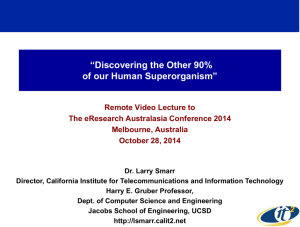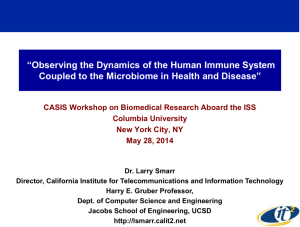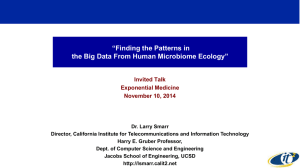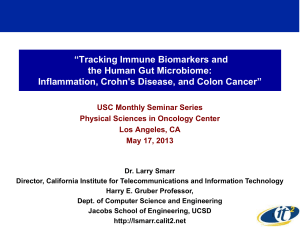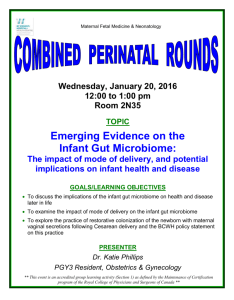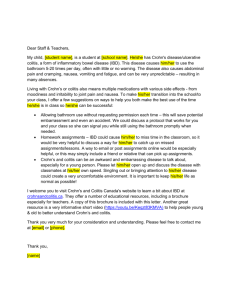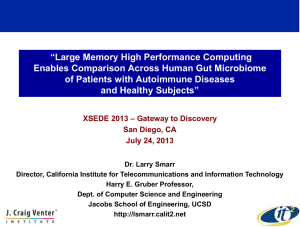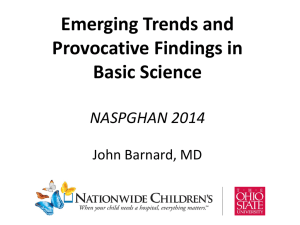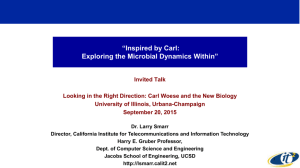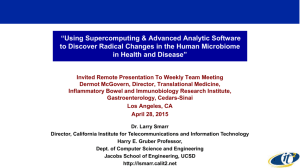PPT - Larry Smarr - California Institute for Telecommunications and
advertisement
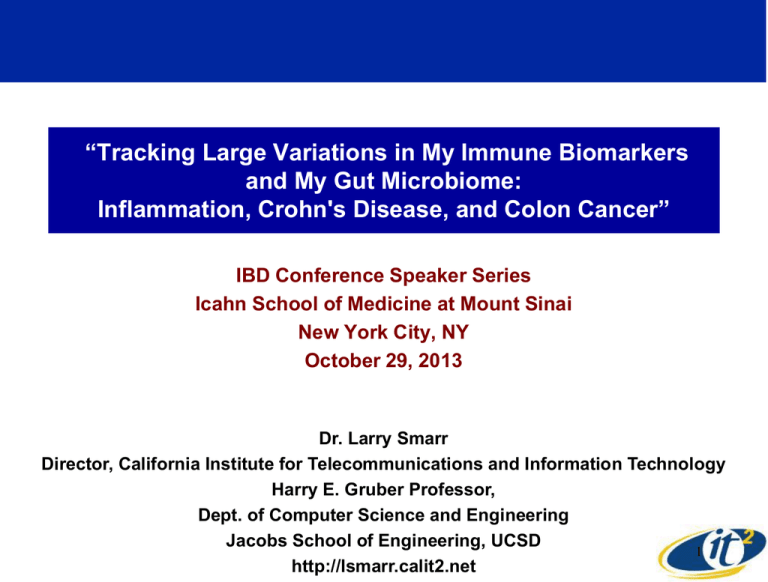
“Tracking Large Variations in My Immune Biomarkers and My Gut Microbiome: Inflammation, Crohn's Disease, and Colon Cancer” IBD Conference Speaker Series Icahn School of Medicine at Mount Sinai New York City, NY October 29, 2013 Dr. Larry Smarr Director, California Institute for Telecommunications and Information Technology Harry E. Gruber Professor, Dept. of Computer Science and Engineering Jacobs School of Engineering, UCSD 1 http://lsmarr.calit2.net From Quantified Self to National-Scale Biomedical Research Projects My Anonymized Human Genome is Available for Download The Quantified Human Initiative is an effort to combine our natural curiosity about self with new research paradigms. Rich datasets of two individuals, Drs. Smarr and Snyder, serve as 21st century personal data prototypes. www.delsaglobal.org www.personalgenomes.org I Arrived By Measuring in La Jolla theinState 2000of After My Body 20 Years andin “Tuning” the Midwest It Using and Decided Nutrition to and Move Exercise, Against Ithe Became Obesity Healthier Trend Age 41 Age 51 Age 61 1999 2000 1999 1989 I Reversed My Body’s Decline By Quantifying and Altering Nutrition and Exercise http://lsmarr.calit2.net/repository/LS_reading_recommendations_FiRe_2011.pdf 2010 From One to a Billion Data Points Defining Me: The Exponential Rise in Body Data in Just One Decade! Genome Billion:Microbial My Full DNA, MRI/CT Images Improving Body SNPs Million: My DNA SNPs, Zeo, FitBit Discovering Disease Blood Variables One: My Weight Weight Hundred: My Blood Variables Each is a Personal Time Series And Compared Across Population Visualizing Time Series of 150 LS Blood and Stool Variables, Each Over 5-10 Years Calit2 64 megapixel VROOM I Discovered I Had Episodic Chronic Inflammation by Tracking Complex Reactive Protein In My Blood Samples 27x Upper Limit Antibiotics Normal Range <1 mg/L Antibiotics Normal CRP is a Generic Measure of Inflammation in the Blood By Adding Stool Samples, I Discovered I Had High Levels of the Protein Lactoferrin Shed from Neutrophils Typical Lactoferrin Value for Active IBD Normal Range <7.3 µg/mL 124x Upper Limit Antibiotics Antibiotics Lactoferrin is a Protein Shed from Neutrophils An Antibacterial that Sequesters Iron Four Immune Biomarkers Over Time Compared with Four Signs/Symptoms Here Immune biomarkers are normalized 0 to 1, with 1 being the highest value in five years Source: Photo of Calit2 64-megapixel VROOM Colonoscopy Images Show Persistent Inflamed Pseudopolyps in 6 inches of Sigmoid Colon Dec 2010 Jan 2012 “Inflammatory polyp versus inflamed fold in the distal sigmoid colon and apthous ulcers in the rectum, consistent with active Crohn’s colitis.” William J. Sandborn, MD UCSD Jan 3, 2012 Confirming the Colonic Crohn’s Hypothesis: Finding the “Smoking Gun” with MRI Imaging Liver Transverse Colon Small Intestine I Obtained the MRI Slices From UCSD Medical Services and Converted to Interactive 3D Working With Calit2 Staff & DeskVOX Software Descending Colon MRI Jan 2012 Cross Section Diseased Sigmoid Colon Major Kink Sigmoid Colon Threading Iliac Arteries MRE Reveals Inflammation in 6 Inches of Sigmoid Colon Thickness 15cm – 5x Normal Thickness “Long segment wall thickening in the proximal and mid portions of the sigmoid colon, extending over a segment of approximately 16 cm, with suggestion of intramural sinus tracts. Edema in the sigmoid mesentery and engorgement of the regional vasa recta.” – MRI report Jan 2012 Crohn's disease affects the thickness of the intestinal wall. Having Crohn's disease that affects your colon increases your risk of colon cancer. Clinical MRI Slice Program DeskVOX 3D Image Why Did I Have an Autoimmune Disease like IBD? Despite decades of research, the etiology of Crohn's disease remains unknown. Its pathogenesis may involve a complex interplay between host genetics, immune dysfunction, and microbial or environmental factors. --The Role of Microbes in Crohn's Disease I Have Been Quantifying All Three Paul B. Eckburg & David A. Relman Clin Infect Dis. 44:256-262 (2007) Quantifying My Gut Microbiome First, Analyze the Dynamics of My Microbiome Ecology85% of the Species Can Not Be Cultured Your Body Has 10 Times As Many Microbe Cells As Human Cells 99% of Your DNA Genes Are in Microbe Cells Not Human Cells Inclusion of the Microbiome Will Radically Change Medicine J. Craig Venter Institute Performed Metagenomic Sequencing on Seven of My Stool Samples • Sequencing on Illumina HiSeq 2000 at JCVI • Generates 100bp Reads • Run Takes ~14 Days • My 7 Samples Produced – 190.2 Gbp of Data • DNA Extraction Uses Illumina HiSeq 2000 at JCVI – Standard MOBio Powersoil DNA Extraction • JCVI Lab Manager, Genomic Medicine – Manolito Torralba • IRB PI Karen Nelson – President JCVI Manolito Torralba, JCVI Karen Nelson, JCVI Additional Phenotypes Added from NIH HMP For Comparative Analysis Download Raw Reads ~100M Per Person “Healthy” Individuals 35 Subjects 1 Point in Time Larry Smarr IBD Patients 2 Ulcerative Colitis Patients, 6 Points in Time 7 Points in Time 5 Ileal Crohn’s Patients, 3 Points in Time Total of 5 Billion Reads Source: Jerry Sheehan, Calit2 Weizhong Li, Sitao Wu, CRBS, UCSD We Created a Reference Database Of Known Gut Genomes • NCBI April 2013 – – – – 2471 Complete + 5543 Draft Bacteria & Archaea Genomes 2399 Complete Virus Genomes 26 Complete Fungi Genomes 309 HMP Eukaryote Reference Genomes • Total 10,741 genomes, ~30 GB of sequences Now to Align Our 5 Billion Reads Against the Reference Database Source: Weizhong Li, Sitao Wu, CRBS, UCSD Computational NextGen Sequencing Pipeline: From “Big Equations” to “Big Data” Computing PI: (Weizhong Li, CRBS, UCSD): NIH R01HG005978 (2010-2013, $1.1M) We Used SDSC’s Gordon Data-Intensive Supercomputer to Analyze a Wide Range of Gut Microbiomes • ~180,000 Core-Hrs on Gordon – KEGG function annotation: 90,000 hrs – Mapping: 36,000 hrs – Used 16 Cores/Node and up to 50 nodes – Duplicates removal: 18,000 hrs Enabled by a Grant of Time – Assembly: 18,000 hrs on Gordon from SDSC – Other: 18,000 hrs Director Mike Norman • Gordon RAM Required – 64GB RAM for Reference DB – 192GB RAM for Assembly • Gordon Disk Required – Ultra-Fast Disk Holds Ref DB for All Nodes – 8TB for All Subjects Using Scalable Visualization Allows Comparison of the Relative Abundance of 200 Microbe Species Comparing 3 LS Time Snapshots (Left) with Healthy, Crohn’s, UC (Right Top to Bottom) Calit2 VROOM-FuturePatient Expedition Lessons from Ecological Dynamics I: Gut Microbiome Has Multiple Relatively Stable Equilibria “The Application of Ecological Theory Toward an Understanding of the Human Microbiome,” Elizabeth Costello, Keaton Stagaman, Les Dethlefsen, Brendan Bohannan, David Relman Science 336, 1255-62 (2012) Comparison of 35 Healthy to 15 CD and 6 UC Gut Microbiomes at the Phyla Level Expansion of Actinobacteria Collapse of Bacteroidetes Explosion of Proteobacteria Lessons From Ecological Dynamics II: Invasive Species Dominate After Major Species Destroyed ”In many areas following these burns invasive species are able to establish themselves, crowding out native species.” Source: Ponderosa Pine Fire Ecology http://cpluhna.nau.edu/Biota/ponderosafire.htm Almost All Abundant Species (≥1%) in Healthy Subjects Are Severely Depleted in Larry’s Gut Microbiome Top 20 Most Abundant Microbial Species In LS vs. Average Healthy Subject 152x 765x 148x Number Above LS Blue Bar is Multiple of LS Abundance Compared to Average Healthy Abundance Per Species 849x 483x 220x 201x169x 522x Source: Sequencing JCVI; Analysis Weizhong Li, UCSD LS December 28, 2011 Stool Sample Rare Firmicutes Bloom in Colon Disappearing After Antibiotic/Immunosuppressant Therapy Firmicutes Families Therapy Parvimonas spp. LS Time 1 Healthy Average LS Time 2 Lessons From Ecological Dynamics III: From Equilibrium to Chaos In addition to chaos, other forms of complex dynamics, such as regular oscillations & quasiperiodic oscillations, are preeminent features of many biological systems. -From “Biological Chaos and Complex Dynamics” David A. Vasseur Oxford Bibliographies Online The Dramatic Bloom of Enterobacteriaceae bacterium 9_2_54FAA This Microbe is a Proteobacteria Targeted by the NIH HMP 1,000x 21,000x LS5LS6 Can Microbial Metagenomics Diagnose Disease States? From www.23andme.com Mutation in Interleukin-23 Receptor Gene—80% Higher Risk of Pro-inflammatory Immune Response SNPs Associated with CD 2009 Phyla Gut Microbial Abundance Without Viruses: LS, Crohn’s, UC, and Healthy Subjects Source: Weizhong Li, Sitao Wu, CRBS, UCSD LS Crohn’s Ulcerative Colitis Healthy Toward Noninvasive Microbial Ecology Diagnostics Clustering Using Supervised Classification Algorithms: SLiME: Synthetic Learning in Microbial Ecology Papa, et al. PLOS ONE (2012) Is the Gut Microbial Ecology Different in Crohn’s Disease Subtypes? Ben Willing, GASTROENTEROLOGY 2010;139:1844 –1854 It Appears That Metabolomics Can Differentiate Ileum vs. Colon Inflammation in Crohn’s Disease blue N= Ileum (ICD) red N= Colon (CCD) green N= Healthy Jansson, et al. PLOS ONE, July 2009 | Volume 4 | Issue 7 | e6386 Quantifying My Human Genome I Compared my 23andme SNPs With the 163 Known SNPs Associated with IBD • The width of the bar is proportional to the variance explained by that locus • Bars are connected together if they are identified as being associated with both phenotypes • Loci are labelled if they explain more than 1% of the total variance explained by all loci “Host–microbe interactions have shaped the genetic architecture of inflammatory bowel disease,” Jostins, et al. Nature 491, 119-124 (2012) I Found I Had One of the Earliest Known SNPs Associated with Crohn’s Disease From www.23andme.com ATG16L1 IRGM NOD2 Polymorphism in Interleukin-23 Receptor Gene — 80% Higher Risk of Pro-inflammatory Immune Response rs1004819 SNPs Associated with CD There Is Likely a Correlation Between CD SNPs and Where and When the Disease Manifests NOD2 (1) rs2066844 Subject with Ileal Crohn’s Female CD Onset At 20-Years Old Il-23R rs1004819 Subject with Colon Crohn’s Me-Male CD Onset At 60-Years Old Source: Larry Smarr and 23andme I Also Had an Increased Risk for Ulcerative Colitis, But a SNP that is Also Associated with Colonic CD I Have a 33% Increased Risk for Ulcerative Colitis HLA-DRA (rs2395185) I Have the Same Level of HLA-DRA Increased Risk as Another Male Who Has Had Ulcerative Colitis for 20 Years “Our results suggest that at least for the SNPs investigated [including HLA-DRA], colonic CD and UC have common genetic basis.” -Waterman, et al., IBD 17, 1936-42 (2011) Now Working with 23andme Comparing 163 Known IBD SNPs with 23andme SNP Chip • Currently 300,000 23andme Members – Growing Rapidly to One Million • IBD Affects ~1/300 Americans – Implies ~3000 IBD Subjects – Detailed IBD Survey to Members for Phenotyping • Enables Internal GWAS • Also Working with Crohnology (Sean Ahrens) – Encouraging His >5000 Crohn’s Members to Use 23andme – Combine SNPs with Detailed Phenotyping and Drug Impacts www.crohnology.com Quantifying My Human Immune System I Have Been Quantifying the Time Behavior of the Coupled Immune System and Microbiome “Advances in our understanding of the interplay between components of the innate and adaptive arms of the immune system will be central to future progress.” - Judy H. Cho, The Genetics and Immunopathogenesis of Inflammatory Bowel Disease, Nature Reviews Immunology (2008) Fine Time Resolution Sampling Reveals Unexpected Oscillations of Innate and Adaptive Immune System LS Data from Yourfuturehealth.com Lysozyme & SIgA From Stool Tests Innate Immune System Normal Therapy: 1 Month Antibiotics +2 Month Prednisone Adaptive Immune System Normal Time Points of Metagenomic Sequencing of LS Stool Samples LS Cultured Bacterial Abundance Reveals Oscillatory Microbiome Ecology Time Points of Metagenomic Sequencing of LS Stool Samples LS Data from Yourfuturehealth.com Time Series Reveals Autoimmune Dynamics of Gut Microbiome by Phyla Therapy Six Metagenomic Time Samples Over 16 Months Fusobacteria Are Found To Be More Abundant In Colonrectal Carcinoma (CRC) Tissue et al. et al. Class Fusobacteria Is Enriched in Human Colon Cancer Tumors “…the relative abundance of Fusobacterium was highly enriched in the population of tumor versus normal samples…” Kostic, A. D., et al. “Genomic analysis identifies association of Fusobacterium with colorectal carcinoma”, v. 22: 292–298 (2012) The Bacterial Driver-Passenger Model for Colorectal Cancer Initiation Is Fusobacterium nucleatum a “Driver” or a “Passenger” “Early detection of Colorectal Cancer (CRC) is one of the greatest challenges in the battle against this disease & the establishment of a CRC-associated microbiome risk profile could aid in the early identification of individuals who are at high risk and require strict surveillance.” Tjalsma, et al. Nature Reviews Microbiology v. 10, 575-582 (2012) “Arthur et al. provide evidence that inflammation alters the intestinal microbiota by favouring the proliferation of genotoxic commensals, and that the Escherichia coli genotoxin colibactin promotes colorectal cancer (CRC).” Christina Tobin Kåhrström Associate Editor, Nature Reviews Microbiology Inflammation Enables Anaerobic Respiration Which Leads to Phylum-Level Shifts in the Gut Microbiome Sebastian E. Winter, Christopher A. Lopez & Andreas J. Bäumler, EMBO reports VOL 14, p. 319-327 (2013) Does Intestinal Inflammation Select for Pathogenic Strains That Can Induce Further Damage? AIEC LF82 “Adherent-invasive E. coli (AIEC) are isolated more commonly from the intestinal mucosa of individuals with Crohn’s disease than from healthy controls.” “Thus, the mechanisms leading to dysbiosis might also select for intestinal colonization with more harmful members of the Enterobacteriaceae* —such as AIEC— thereby exacerbating inflammation and interfering with its resolution.” Sebastian E. Winter , et al., EMBO reports VOL 14, p. 319-327 (2013) E. coli/Shigella Phylogenetic Tree Miquel, et al. PLOS ONE, v. 5, p. 1-16 (2010) *Family Containing E. coli Chronic Inflammation Can Accumulate Cancer-Causing Bacteria in the Human Gut Escherichia coli Strain NC101 Deep Metagenomic Sequencing D Enables Strain Analysis B2 E B1 Phylogenetic Tree 778 Ecoli strains =6x our 2012 Set S A We Divided the 778 E. coli Strains into 40 Groups, Each of Which Had 80% Identical Genes Group 0: D Group 5: B2 Group 26: B2 Group 7: B2 NC101 LF82 Group 2: E Group 4: B1 Group 3: A, B1 LS00 1 LS00 2 LS00 3 Median CD Median UC Median HE Group 9: S Group 18,19,20: S Next Step: Time Series of Metagenomic Gut Microbiomes and Immune Variables in an N=100 Clinic Trial Goal: Understand The Coupled Human Immune-Microbiome Dynamics In the Presence of Human Genetic Predispositions The Role of Bacteriophage in IBD What Caused the Dramatic Drop in My Inflammation Before Taking Antibiotics? 27x Upper Limit Antibiotics Normal Range <1 mg/L Antibiotics Normal CRP is a Generic Measure of Inflammation in the Blood Radical Shift in Relative Abundance After Therapy LS001 Viral Abundance is Similar to Some UC Patients, But Different Families Virus Families LS001 Relative Abundance of Viruses Among All Virus, Bacteria, Archaea, Eukaryota Podoviridae SP6-Like All 3 SP6-Like Vanish in LS002/003 Siphoviridae Abundance >0.1% Out of 493 Viral Reference Species My Viral Load is Mainly SP-6 Like Reduction in E. coli Over Time With Major Shifts in Strain Abundance Therapy Strains >0.5% Included Log Reduction in LS Viral Relative Abundance Over Time Thanks to Our Great Team! UCSD Metagenomics Team Weizhong Li Sitao Wu JCVI Team Karen Nelson Shibu Yooseph Manolito Torralba Calit2@UCSD Future Patient Team Jerry Sheehan Tom DeFanti Kevin Patrick Jurgen Schulze Andrew Prudhomme Philip Weber Fred Raab Joe Keefe Ernesto Ramirez SDSC Team Michael Norman Mahidhar Tatineni Robert Sinkovits
